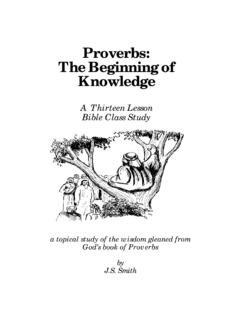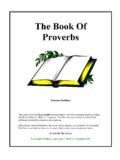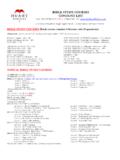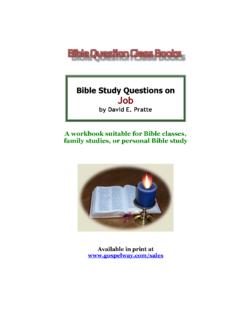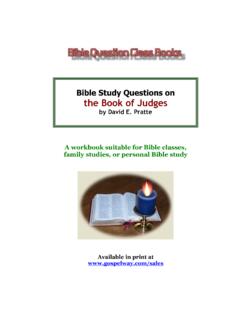Transcription of CLASS NOTES on CHRISTIAN ETHICS
1 CLASS NOTES on CHRISTIAN ETHICS " CHRISTIAN ETHICS is a study of the conduct which should characterize the true believer in Christ in view of statements, principles, and implications of Scripture properly interpreted and rightly divided." --- W. P. Heath 1A. Introduction 1B. The meaning of the word " ETHICS ." 1C. According to the dictionary: "1. A treatise on morals. 2. The science of moral duty; broadly, the science of human character. 3. Moral principles, quality, or practice." 2C. Related words (according to the dictionary): 1D. "Decorum" -- Suggests rigidity or formality in codes of behavior.
2 2D. "Decency" -- Suggests fitness of one to another. 3D. "Propriety" -- A standard of what is proper or correct -- often implies extreme formality of observance. 4D. "Etiquette" -- The usual word for the code governing manners and conduct, especially in society, and for the conventional observance of such rules. 5D. All of the above words mean a code of rules respecting what is right or fitting, honorable, etc., in conduct or behavior or the character derived from it. 2B. The meaning of the word "moral." 1C. Sometimes it means merely conforming to a standard of what is good or right.
3 It is especially applied to conduct or character. 2C. We usually use this word to apply to serious matters like stealing, murder, and adultery. 3C. It often refers specifically to sexual conduct. 4C. Related words: 1D. "Righteous" -- Guiltlessness or blamelessness. 2D. "Virtuous" -- The possession or manifestation of moral excellence. 3D. "Noble" -- Eminence in virtuousness. 2A. Preliminary considerations. 1B. The necessity of the new birth. John 3:7; 1 Cor. 2:14. 1C. Correct conduct ( ETHICS ) cannot make a person a CHRISTIAN .
4 Rom. 4:4, 5; Eph. 2:8, 9; Titus 3:5 etc. 2C. Scripturally correct conduct ( CHRISTIAN ETHICS ) is impossible to the natural (unsaved) man. Rom. 8:7, 8. 3C. The implantation of the new nature makes correct conduct possible. Rom. 6:14; Gal. 2:19, 20; Eph. 2:10; Col. 3:10; etc. 2B. Both the desire to do what is right and the ability to do it are from God. Phil. 2:13; 4:13; Heb. 13:20, 21. 3B. The knowledge of what is right requires a careful study of the written Word of God. 1C. Conscience alone is not enough. CLASS NOTES -- CHRISTIAN ETHICS 2 1D.
5 A conscience may be: 1E. Weak. 1 Cor. 8:7, 12. 2E. Uninstructed. 1 Cor. 10:27 - 29 (the "strong" believer's conscience knows what the will of God is, the "weak" brother's does not). 3E. Defiled. 1 Cor. 8:7; Titus 1:15. 4E. Evil. Heb. 10:22 (an "evil" conscience is condemning the believer for sins already forgiven). 5E. In need of purging. Heb. 9:14. (the conscience needs to be purged from demanding self righteousness [dead works] to please God). 6E. Seared. 1 Tim. 4:2 (the conscience has become used to evil conduct until it no longer cries out against it.)
6 It is insensitive). 2D. We must not go against conscience, but we need to be sure our conscience is instructed in the Word of God and is in subjection to Him. Rom. 14:14, 23; 1 Cor. 8:7. 2C. A thing is not necessarily right just because we are able to justify it in our own thinking. Judges 17:6; 21:25 and context. Acts 26:9 - 11. 3C. Culture is not a sufficient guide for the CHRISTIAN . Some cultures approve head-hunting, cannibalism, filing of the teeth, mistreatment of women and children, exaltation of materialism, etc. 4C. "Religion" is not a safe guide -- not even the " CHRISTIAN religion.
7 " 1D. For non-Christians: human sacrifice, killing Christians (see the religious zeal of Saul of Tarsus -- carried out in "all good conscience before God" -- Acts 22:23; 23:1) and much more! 2D. As to "Christians" -- confessional, celibacy of priests, rules of dress & diet, etc. 5C. Even Scripture is not a safe guide unless it is correctly interpreted and rightly divided. Matt. 5:29, 30; 10:9, 10; Mark 16:18; 1 Cor. 14:39; 16:20; etc. 6C. Instruction of the conscience comes through: 1D. A plain statement of Scripture which is dispensationally TO us (such as Rom.)
8 12:20; Eph. 4:28; 5:18, 22, 25; etc.). 2D. Principles which can be applied to us (such as Phil. 2:5 with the context). 3D. Examples in Scripture (Acts 15:36 - 40). This passage will be discussed fully later. 4D. Implications from Scripture (closely associated with "3D" above) Phil. 2:21. The implication: that we should seek the things that are Christ's and not the things that are our own. 5D. Application of instructions from other dispensations (related to "2D" above). While the instructions given in Matt. 18:15 - 17 are given to the kingdom church, they can be applied, at least in part, to the church of today -- as long as we do not violate any instruction given to us by Paul.
9 CLASS NOTES -- CHRISTIAN ETHICS 3 3A. Statements in Scripture regarding conduct. 1B. The Law of Moses. 1C. The Ten Commandments. 1D. The "moral" commandments. These principles of right and wrong existed long before they were incorporated into the Decalog. They were put into the Law because they were right. If available, see the article on Law and Grace in the author s book "Help in Hard Places." 12D. The one "'ceremonial" commandment (the fourth) was right because it was commanded, the other nine were commanded because they were right. ("Ceremonial" is a term not used of the Sabbath commandment in Scripture, but is a term chosen by me to indicate the distinction noted here) 3D.
10 All of these commandments, except the Sabbath commandment, are set before us, in amplified form, as principles of conduct under grace. See Appendix number one of the CLASS NOTES on Exodus. 2C. The "judgments" (what was legally enforced under Law can often be an indication to us of what would be a "fair solution" to problems today). 1D. Ex. 21:28. (Accidental death); 21:29 (gross negligence); 21:35 ("no fault" settlement); 21:36 (negligence); etc. 2D. Ex. 23:2-a -- A man is not to get caught up in a "mob" or a "demonstration" and do what he would not do if he thought about it for himself beforehand.
